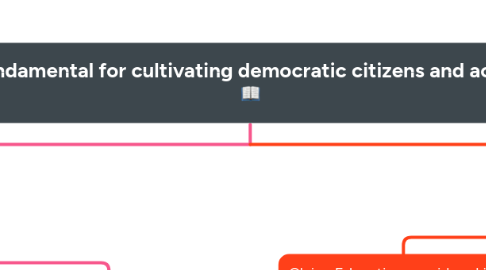
1. Key Term: "Democratic Citizenship" Allen uses this to describe the role of education in shaping/creating active participants in society. It's key to Allen's claim of how education promotes democratic engagement.
2. Key Term 2: "Equality" This is crucial to her argument as she argues that education is the pathway to greater social equality. The term "Equality" is central to her argument as Allen argues that equality is a key outcome of a strong education system
3. Education promotes democratic engagement.
3.1. Claim: Education equips individuals with the skills necessary for civic participation, like voting and serving on juries.
3.1.1. Type of Evidence: Empirical Evidence
3.1.1.1. Example from the text: Allen discusses how public schools are spaces where students learn civic values like voting and serving on juries, necessary for democratic participation.
3.1.1.1.1. Quote: "Students, in other words, are entitled to learn in public schools the 'basic literacy, calculating, and verbal skills necessary to enable children to eventually function productively as civic participants capable of voting and serving on a jury.'" (Page 8)
3.2. Claim: Education develops critical thinking necessary for democratic participation.
3.2.1. Type of Evidence: Historical Reference
3.2.1.1. Allen references philosopher Hannah Arendt, emphasizing that citizenship involves "co-creating a way of life" and that education is extremely important for preparing individuals to engage in this civic role, including future leaders, activists, and citizens necessary for a functioning democracy.
3.2.1.1.1. Quote: "Following philosopher Hannah Arendt, I take citizenship to be the activity of co-creating a way of life, of world-building... This view of politics supports all three models of citizenship because it nourishes future civic leaders, activists, and politicians." (Page 11)
3.3. Claim: Education is foundational to democratic citizenship.
3.3.1. Type of Evidence: Legal Case
3.3.1.1. Example from the text: Allen references the court decision in New York where the court ruled that education must prepare students for "meaningful civic participation" at a higher level than just minimum-wage work.
3.3.1.1.1. Quote: "The court agreed that 'meaningful civic participation' and prospects for 'competitive employment,' not simply minimum-wage employment, demanded a twelfth-grade level of verbal and math skills and similarly advanced competence in social studies and economics." (Page 8)
4. Education Promotes Equality
4.1. Claim: Education provides skills that can reduce income inequality and expand opportunities.
4.1.1. Type of Evidence: Statistical Evidence
4.1.1.1. Example from the text: Allen discusses the relationship between education attainment and income equality, showing that higher education can reduce economic diffrences.
4.1.1.1.1. "The vocational approach imagines that this equal attainment will translate into a wider distribution of skills, which will reduce income inequality." (Page 9)
4.2. Claim: Education helps promote social justice by addressing inequalities.
4.2.1. Type of Evidence: Economic Analysis
4.2.1.1. Example from the text: Allen references economists like Joseph Stiglitz who argue that inequality is a result of policy choices, and improving education access can help create fairer economic outcomes for people.
4.2.1.1.1. "'Inequality,' as Joseph Stiglitz argues in Rewriting the Rules of the American Economy (2015), 'has been a choice.' Achieving an economy with more egalitarian outcomes will require different political choices and economic policies." (Page 9)
4.3. Claim: Education promotes fairness by promoting political equality and reducing social inequalities.
4.3.1. Type of Evidence: Policy Discussion
4.3.1.1. Example from the text: Allen talks about the broader role of education policies in reducing inequality showing how changes in educational policy could help create more equitable social outcomes.
4.3.1.1.1. Quote: "The participatory paradigm demands a higher educational standard than the vocational, and meeting that standard requires that more resources be allocated for schools... defending the right to civic education... would benefit not only individual students but also society as a whole, advancing both political equality and distributive justice." (Page 12)
